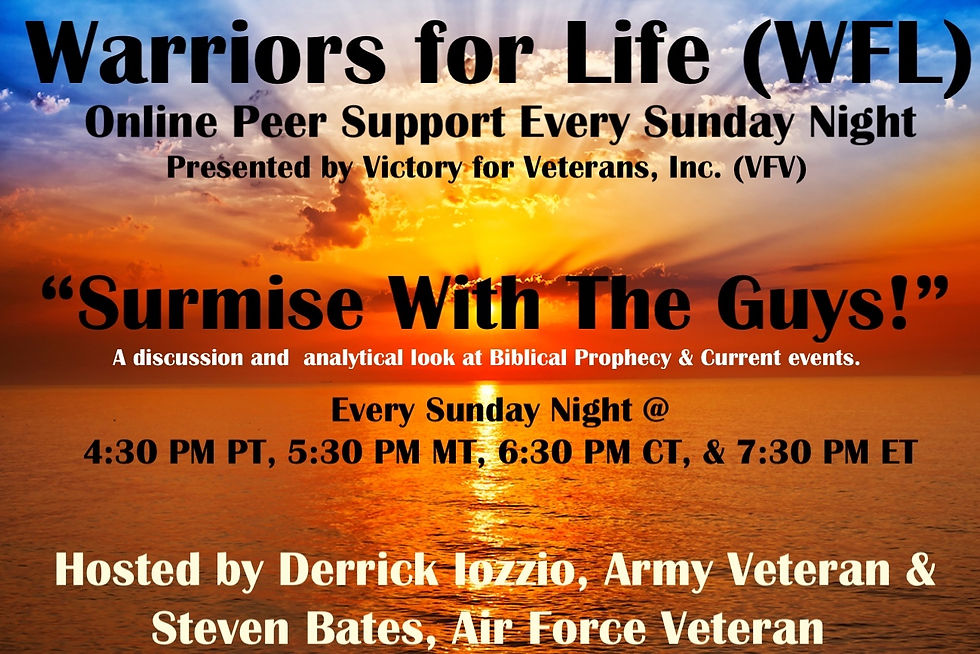TONIGHT Join Steven & Friends for "Wisdom from a Western!" with Warriors for Life (WFL)
- Col (Ret) Mikel Burroughs

- Nov 18, 2025
- 4 min read
Join our Volunteer, Air Force Veteran, Peer Support Specialist, and Writer/Author Steven Bates TONIGHT for "Mid-Week Musings!" edition of Warriors for Life (WFL) Online, sponsored and presented by Victory for Veterans, Inc. (VFV).
We are asking everyone to share who we are and what support that Victory for Veterans, Inc. (VFV) is providing via WFL. If you know someone who is a veteran, first responder or a family member/caregiver, please ask them to join us for at least one meeting so they can learn more about what we do and how they can share their wisdom with others who may be able to learn from them.

TONIGHT's Topic: "Wisdom from a Western!"
"The Story of Shane!"

"Jack Shaefer, arguably one of the most prolific authors of the Western genre and, according to some, writer of the greatest Western novel ever produced, Shane, was born on this day in 1907. Jack, in his stories, taught us a lot about character, and believe it or not, his lessons can apply to the veteran as well.

So how can a Western protagonist relate to veterans? What could a cowboy possibly have in common with a Soldier, Sailor, an Airman, or Marine?"
A cowboy and a member of the armed forces share core values such as courage, duty, honor, integrity, and fierce loyalty. Both lifestyles also demand self-reliance, resilience, and a strong, unwavering work ethic in challenging environments.

Key similarities include:
Courage: Both roles require individuals to face fear, danger, and adversity, whether it is the physical duress of a combat zone or the harsh, untamed conditions of the open range.
Duty and Selfless Service: A cowboy's "Code of the West" emphasizes doing what has to be done and finishing what is started, which is a strong parallel to the military's concept of duty and selfless service to a mission or country.
Honor and Integrity: Both the cowboy code and military values stress the importance of honesty, trustworthiness, and living up to one's promises and commitments.
Loyalty: Fierce loyalty to one's companions and team is a hallmark of both groups. In the military, this means never leaving a fallen comrade, while for cowboys, it means standing by fellow riders and "riding for the brand".
Self-Reliance and Resilience: Due to the nature of their isolated or demanding work environments, both cowboys and service members must be resourceful, adaptable, and able to rely on their own skills and wits to survive and succeed.
Work Ethic: Both lifestyles are characterized by long hours of hard work, often in difficult conditions, with a "can't quit, won't quit" attitude until the job is done.
Ultimately, both figures are iconic symbols of the American character, embodying rugged individualism tempered by a deep sense of community and moral responsibility.
Themes Relevant to the Veteran Experience
Psychological Trauma and Fear: The novel focuses heavily on the psychological impacts of war, particularly the raw, primal fear that soldiers experience in combat. This resonates with the realities of combat stress and PTSD, illustrating the universal human struggle to cope with life-threatening situations and the resulting mental toll.
Loss of Innocence and Disillusionment: Henry enlists with romanticized ideas of glory and heroism but quickly becomes disillusioned by the brutal, chaotic, and impersonal reality of industrial warfare. This mirrors the experience of many service members who transition from civilian life to the harsh realities of deployment, losing their pre-war naiveté.
Identity and Manhood: Henry struggles with his self-perception, trying to prove his courage and define what it means to be a man in the face of fear and the expectations of society. This speaks directly to veterans' issues of identity formation and the challenge of reintegrating into a society that often has a simplified, "John Wayne" image of military service.
Camaraderie and Alienation: The intense bonds formed among soldiers in shared adversity are a core element of the novel, as is the feeling of isolation when one's internal struggles cannot be easily shared (Henry's shame after fleeing). The difficulty veterans face in communicating their experiences to civilians, leading to feelings of alienation, is a persistent contemporary issue.
The Search for Redemption and Purpose: After running away, Henry seeks a "red badge of courage" (a wound) to validate his bravery and redeem himself. Ultimately, his redemption comes not from a physical mark, but from self-acceptance and a newfound, quiet resilience and sense of purpose within his unit. This journey reflects the veteran's often challenging path to find new purpose and peace after military service.

Join Air Force veteran, author, and Peer Support Specialist Steven Bates tonight with the Warriors for Life Mid-Week Musings as we discuss a classic Western novel and how it can incredibly relate to the veteran, teaching us about ourselves and the issues we deal with.
Warriors for Life (WFL) Online "Mid-Week Musings!" edition presented by Victory for Veterans, Inc. (VFV) — Wednesday (TONIGHT), November 19, 2025, @ 4:30 PM PT, 5:30 PM MT, 6:30 PM CT, & 7:30 PM ET
Join Zoom Meeting: https://us06web.zoom.us/j/87440882846
Thank you,
Steven Bates
Air Force Veteran, Writer/Author, Peer Support Specialist, &
Volunteer Facilitator, Victory for Veterans, Inc.




Comments